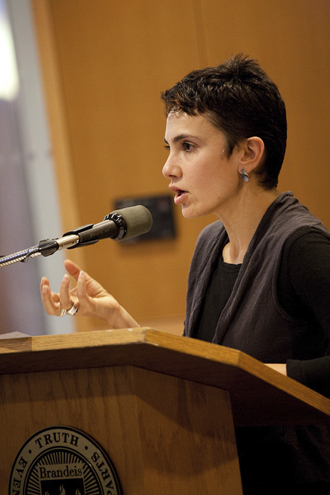Decriminalization of same-sex relations in India discussed
Professor draws on her fieldwork with the New Delhi police

Puri's lecture in the Mandel Center Atrium

Jyoti Puri, professor of sociology and women’s studies at Simmons College
Two years after the High Court in New Delhi decriminalized same-sex relations between consenting adults in India, Jyoti Puri, professor of sociology and women’s studies at Simmons College stood in the Mandel Center Atrium discussing the enforcement of Section 377 of the Indian Penal Code, a colonial law dating back to 1860, which made homosexuality a punishable offense.
Her talk, “Racialized Communalisms, Criminalized Queers, and the Police in Contemporary India,” was part of the Soli Sorabjee Lecture Series and drew upon her fieldwork with the New Delhi police with whom she conversed about social opinions and stereotypes regarding sexuality, enforcement of the sodomy law and the degree to which sexual rights are respected in India today.
Puri began the lecture by describing what it was like for her, a middle class Indian woman, conducting a sexuality discussion with 30 male police constables.
“The constables’ assertion that crimes of unnatural sex occurs more frequently amongst Muslims and Sikhs is a stunning displacement of sexual grievance on to cultural communities,” Puri says. She presented figures from the 2001 census in India, which states that Muslims and Sikhs combined made up only approximately 16 percent of the population, and that it was impossible to justify the racialization of sexual crimes in India. She attributed the racialization and stereotyping of Muslims in India to “cultural discourses of blood psyche and sinew” as opposed to any discernable physical differences.
Puri focused part of the discussion on what she calls the “myth of the over-sexed Muslim man and his fertile wife, or wives,” explaining that differences in eating habits, religious practices and cultural customs strengthen the divide between Hindus and Muslims in India. She also expressed her belief that the overturning of Section 377 was integral to the development of India as a contemporary democratic nation, where even the lower classes of society are beginning to question issues such as ethics, moral codes, human rights and social justice; concerns which can be taken for granted in the West.
Even the police constables supported the new law, a surprisingly open-minded view, she said.
Puri calls Section 377 a “burden of colonial history,” one in a long line of colonial laws, some of which date back to the late 1800’s, which now have no place in contemporary India.
Puri’s lecture was met with loud applause. Aziz Sohail’13, a Pakistani student considering a minor in sexuality and queer studies at Brandeis, expressed gratitude that Puri had approached this issue in a way which was easily accessible to all who were interested.
“I really enjoyed your lecture and understood every word, which is a compliment,” Sohail said.
The talk was part of the Soli Sorabjee Lectures in South Asian Studies and sponsored by the department of South Asian studies and the Brandeis-India Initiative. It was created in 2009 to honor of Soli Sorabjee, a celebrated human rights lawyer, former attorney general of India and member of the United Nations Human Rights Commission since 1997.
According to Singh, the purpose of the Soli Sorabjee lecture series is to bring together scholars, academics, and eminent figures in South Asian sociology, economics and politics in order to help bring different and fresh perspectives to the small South Asian Studies program at Brandeis and allow for broadening of students’ perspectives of the field.
Categories:






